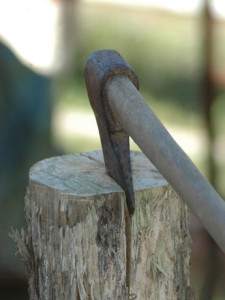 Let’s return to Letters of E. B. White (HarperCollins 2006) to find out how to become better writers. White should know, and he shows us, without really trying, in many of these letters. It’s all in the concrete details.
Let’s return to Letters of E. B. White (HarperCollins 2006) to find out how to become better writers. White should know, and he shows us, without really trying, in many of these letters. It’s all in the concrete details.
. . .
But a little stage-setting first. One of White’s correspondents once asked him about his stance on religion, and his epistolary response went like this. He said that, yes, there was in him some religious sentiment, but it was like the world before the Lord got hold of it: without form and void. Like many folks who have vague, inchoate religious stirrings and feelings, White was attuned to the natural world (especially the barnyard), was a keen observer of nature, and loved life because of it. (He often invokes Thoreau.)
religion, and his epistolary response went like this. He said that, yes, there was in him some religious sentiment, but it was like the world before the Lord got hold of it: without form and void. Like many folks who have vague, inchoate religious stirrings and feelings, White was attuned to the natural world (especially the barnyard), was a keen observer of nature, and loved life because of it. (He often invokes Thoreau.)
In his short story “The Second Tree from the Corner” (which is slightly autobiographical), the main character thinks he detects some incipient neuroses, so he goes to see a psychiatrist, who doesn’t do him much good. But on leaving the psychiatrist’s office, the character happens to glance up and see the glory and beauty of a tree gilded by the setting sun. Then . . . things are pretty much all right with him. He carries on with a slight spring in his step. In a letter dated January 1945, White writes:
Don’t worry about my health – I am a lot better and plenty good enough for my purposes. I had two things the matter with me – mice in the subconscious and spurs in the cervical spine. Of the two the spine trouble was less bothersome. It took me eighteen months to find out how you get rid of mice and if you ever need to know I’ll be glad to give you the instructions. The whole key to the neurotic life is simple; in fact the simplicity of it is the greatest hurdle, because it tends to make it impossible or unacceptable to highly complex natures, who insist on meeting their trouble with suitably devious devices and cures. Anyway, here I am, in the clear again and damned thankful to be here.
White is often described as taking the stance of the detached, ironic observer. I bet I can guess how he got rid of the “mice in the subconscious.”
. . .
So, then, carefully observing and appreciating the world around you – especially its beauties and its ineluctable ironies – is the key to at least a tenuous grasp on sanity and to good writing. Reproducing, with palpably sensuous imagery, the details of the observed natural world is what makes for good writing, of any kind, and that’s what White did well.
Here’s an example from a letter dated 14 June 1951:
I feel like a louse, or tick, for not having written sooner in answer to your nice letters, but have been having my spring orgy in the barn, settling arguments among the geese, taking temperatures, replacing young robins fallen from nests, stepping on the edges of hoes and rakes, challenging black flies to fifteen rounds without even attempting to make the weight, and constructing jury-rig incubators . . . In March the gander decided that an ordinary 10-quart galvanized pail would do for a mating pond (his exact words were, “I’m ready if you girls are”) and when I got back here in May the three geese were all sitting on eggs in three nests that I had lined up in the barn. When the first egg hatched and the goose saw the result of her labors, she jumped off, grabbed the gosling by the neck, and threw it high and wide.
And another one from 4 April 1954:
Blowing a living gale here from the NW, and the temperature this morning early was 10°. All water pails frozen solid, pasture pond solid, all doors resisting all attempts at ingress and egress, frost-proof valve on outside water line frozen, master of house all alone and frozen, barnyard sunny and full of little black-faced lambs and their mammas. I have spent most of my time, since getting here, keeping the kitchen stove hooked up to fever pitch. Coldest 4th of April since 1879. Am living on a straight diet of rye whiskey and Franco-American spaghetti. The first night I was here, though, I boiled a potato and it was quite an experience.
See how it works? You can see everything he says because White is a keen observer and doesn’t deal in generalities and vague abstractions. I’d also recommend that you take a look at his ruminative essay “Once More to the Lake.” As in the extracts above, he piles concrete detail upon concrete detail, so that you feel as though you are right there with him and “the boy” in the boat. You smell the odor of fish, you feel the detritus of fishing trips under your feet, and you see the dragonfly on the tip of your rod. It works.
We’ve all heard the old dictum “Show, don’t tell,” but that’s not really much help. Much better is when a good writer (and a good editor) shows us how to show.

 , after several weeks because a collection of letters lends itself to being consumed in many small bites, Letters of E. B. White, Revised Edition (HarperCollins, 2006). And I’m going to be a
, after several weeks because a collection of letters lends itself to being consumed in many small bites, Letters of E. B. White, Revised Edition (HarperCollins, 2006). And I’m going to be a  We all remember that adamant injunction from our school days: “Never split an infinitive.” I’ve read that this rule comes from the prescriptive pedants who were brought up on Latin. In Latin, of course, you can’t split an infinitive . . . because it’s one word. But we’re not ancient Romans. The best writers always throw out the rules when it serves their purposes.
We all remember that adamant injunction from our school days: “Never split an infinitive.” I’ve read that this rule comes from the prescriptive pedants who were brought up on Latin. In Latin, of course, you can’t split an infinitive . . . because it’s one word. But we’re not ancient Romans. The best writers always throw out the rules when it serves their purposes.